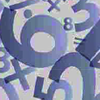News
Right. That's it. We're convinced. We are officially behind team tau! Find out why and celebrate tau day with us!
Agreeing to pay £50,000 for something worth £2 wouldn't win you any haggling competitions. In mathematics, however, a similar result can bring you international acclaim. This is the case with recent progress towards the famous twin prime conjecture.
An "electric atomosphere" is not what you expect at a maths lecture. But it is what prevailed when Andrew Wiles announced his proof of a 350-year-old-old problem, Fermat's last theorem, exactly 20 years ago.
Alan Turing was a mathematician and WWII code breaker who was convicted of homosexuality in the 1950s, chemically castrated as a result, died young in mysterious circumstances and still hasn't received all the recognition
he deserves. His life clearly makes great material for a play — but a musical? We talk to the directors and lead actor of The Universal Machine.
Deciding who is to blame and who should pay for the financial crisis will be a hot topic at the G8 next week. Financial mathematics received a lot of bad press in the aftermath of the crunch and many believe that it was the popularity of mathematical models – often borrowed from physics — that put the financial system at risk. But now models borrowed from biology are helping us understand how this risk might be reduced.
At 9:59 pm (UK time) on Friday, May 31, 2013, asteroid 1998 QE2 will sail serenely past Earth, getting no closer than about 3.6 million miles (5.8 million kilometers), or about 15 times the distance between Earth and the Moon, its closest approach for at least the next two centuries. And you can also catch a glimpse of the asteroid by the power of the internet.
Is there a perfect voting system? In the 1950s the economist Kenneth Arrow asked himself this question and found that the answer is no, at least in the setting he imagined.
Ben Allanach is a theoretical physicist who has worked at CERN and is interested in something called supersymmetry, which predicts particles that could be dark matter and might be produced in the collisions at CERN. Watch Ben explain it all in this TEDx lecture.
From the makers of Dimensions comes a great free online movie exploring dynamical systems, the butterfly effect and chaos theory by means of stunning visuals accompanied by a beautiful musical score.
Every year the London Mathematical Society puts on a pair of popular lectures that are well worth seeing. This year's topics are maths in the court room and the mysteries of additive number theory. Find out more here.
Cosmologists gathered in the Netherlands last week to discuss a new view of the Universe. The Universe as seen by Planck was an international conference to discuss the recently released scientific results from the Planck satellite, including two particularly striking snapshots of the early Universe.


